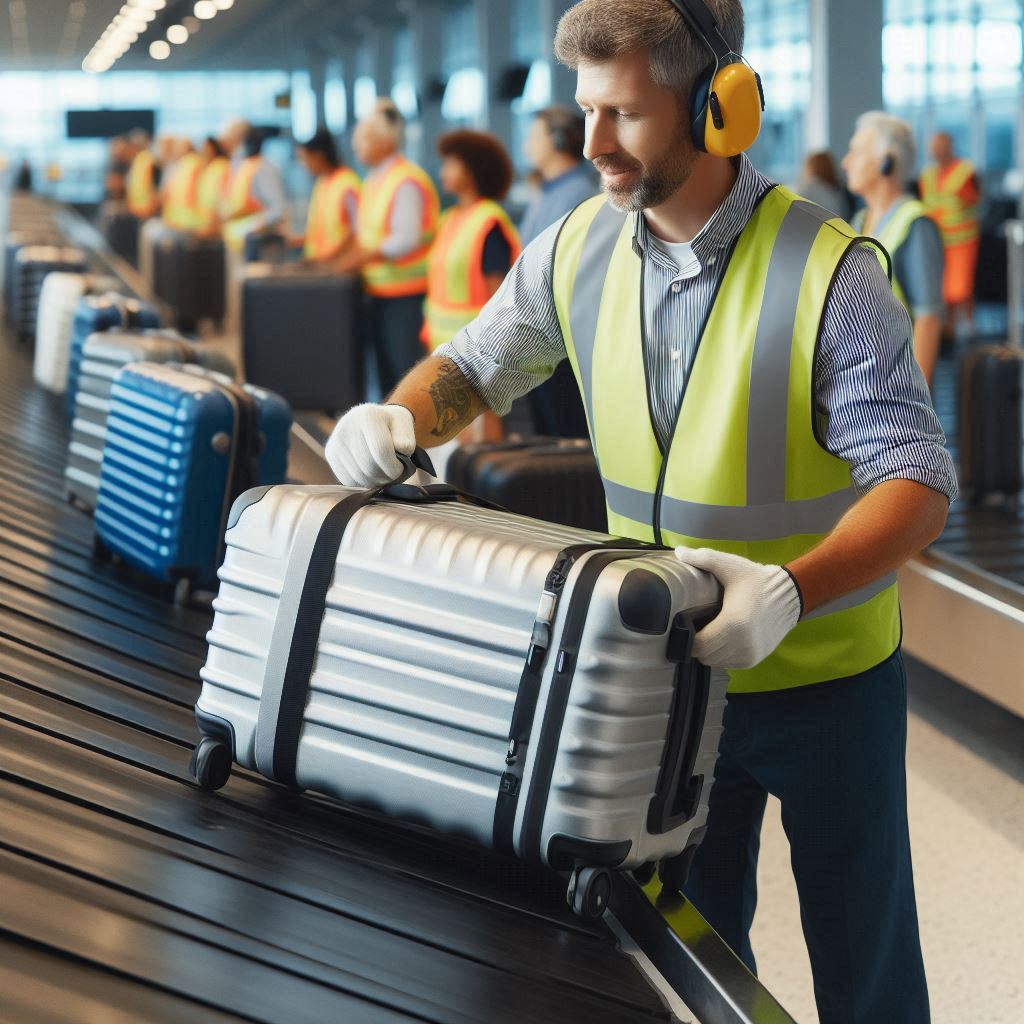Introduction
Baggage handling plays a crucial role in the airline industry.
It ensures that passengers‘ luggage is transported safely and efficiently.
Proper baggage handling enhances customer satisfaction and helps airlines maintain their reputation.
Effective systems reduce the risk of lost or damaged luggage, which can frustrate travelers.
Seasonal variations significantly impact baggage handling work.
During peak travel seasons, such as summer and holidays, airlines experience increased passenger volumes.
This surge leads to a higher volume of baggage that staff must manage efficiently.
Baggage handlers must work quickly to keep up with the demand.
In contrast, the off-peak seasons see reduced passenger numbers and less baggage to handle.
During these times, baggage handling workloads decrease, allowing staff to focus on improving processes.
However, fluctuations in travel patterns can also create challenges.
Unexpected weather events or holidays can lead to sudden spikes in baggage volume, overwhelming staff.
Moreover, seasonal variations often require additional training for baggage handlers.
Employees must adapt to changing conditions and customer expectations throughout the year.
By understanding these variations, airlines can better prepare their baggage handling teams.
Effective planning ensures that staff remain equipped to provide excellent service year-round, regardless of seasonal changes.
Factors influencing seasonal variations
Increased Travel During Peak Seasons
Baggage handling work experiences significant variations during peak travel seasons.
Holiday seasons, such as Thanksgiving and Christmas, see increased passenger numbers.
Summer vacations also lead to a surge in travel.
Airlines often report higher flight bookings during these times.
This increase directly impacts the demand for baggage handling services.
During peak seasons, baggage handlers work longer hours and manage larger volumes of luggage.
Efficiently handling bags becomes crucial to maintain customer satisfaction.
The process of checking in, loading, and unloading luggage requires quick coordination among staff.
Proper staffing levels are essential to meet the heightened demand.
Increased travel often results in a wider variety of luggage.
Handlers must be prepared to manage oversized and specialty items.
Adapting to these changes ensures smooth operations and minimizes delays.
The holiday rush can create a fast-paced work environment, requiring adaptability and teamwork.
Weather-Related Disruptions During Winter Months
Winter months bring unique challenges to baggage handling work.
Snowstorms and icy conditions can lead to flight delays and cancellations.
These weather-related disruptions impact baggage handlers significantly.
Handlers must quickly adapt to changing flight schedules and passenger demands.
During winter, the volume of luggage may fluctuate unpredictably.
A canceled flight can leave handlers with large amounts of unclaimed baggage.
Proper management of these situations is critical for customer satisfaction.
Communication between airlines and baggage handling teams becomes vital during disruptions.
Handlers must also ensure the safe handling of luggage in adverse weather.
Slippery conditions can pose safety risks, requiring extra caution.
Additionally, the cold can affect equipment performance, such as conveyor belts and tugs.
Maintaining equipment and ensuring proper functioning is essential to minimize delays.
Special Events or Conferences Leading to Higher Demand
Special events and conferences can significantly increase the demand for baggage handling services.
Large conventions attract numerous attendees who travel from various locations.
Hotels and venues in host cities often experience higher guest numbers during these events.
Baggage handling teams must prepare for the influx of travelers.
They may need to adjust staffing levels to accommodate larger crowds.
Efficiently managing luggage for conferences ensures smooth check-in and check-out processes.
This can enhance the overall experience for attendees.
Additionally, sporting events, concerts, and festivals also create spikes in travel.
These events often lead to increased flights and baggage volumes.
Handling a variety of luggage types, from suitcases to sports equipment, is essential.
Flexibility in operations is vital to adapt to the unique challenges presented by these events.
In summary, seasonal variations in baggage handling work are influenced by multiple factors.
Increased travel during peak seasons requires effective coordination and staffing.
Weather-related disruptions in winter months pose unique challenges for handlers.
Special events and conferences create additional demand for baggage handling services.
Adapting to these seasonal changes is crucial for ensuring smooth operations and customer satisfaction.
Read: Nail Technician Networking: Building Industry Connections
Challenges Faced During Peak Seasons
Higher Volume of Luggage Leading to Increased Workload for Baggage Handlers
Seasonal variations significantly impact the workload of baggage handlers.
During peak travel seasons, airports experience a surge in passengers.
This increase leads to a higher volume of luggage to manage.
Baggage handlers must adapt to these busy periods with efficiency and speed.
They often work long hours to ensure timely processing.
The heightened demand can be physically taxing and mentally exhausting.
As more travelers arrive, baggage handlers face a constant flow of luggage.
They must quickly and accurately sort bags for various flights.
This fast-paced environment requires strong teamwork and communication skills.
During busy seasons, baggage handlers may also manage oversized and special baggage.
Items such as sports equipment and musical instruments require additional care.
Handling these unique items adds complexity to their tasks.
Moreover, higher luggage volumes increase the chances of mistakes.
Errors can occur during loading and unloading, leading to potential issues.
Accurate labeling and tracking become critical to prevent mix-ups.
Limited Storage Space for Bags During Busy Travel Periods
Limited storage space poses a significant challenge for baggage handlers during peak seasons.
Airports often have designated areas for luggage, but these spaces can fill up quickly.
As more bags arrive, handlers must find creative solutions for storage.
They may need to stack or organize luggage more efficiently.
This task requires attention to detail to avoid damage or loss.
The lack of storage space can create bottlenecks in the baggage handling process.
When space runs out, bags may end up in unintended locations.
This disorganization can lead to delays in processing and increased frustration for travelers.
Baggage handlers often communicate closely with other airport staff.
This collaboration helps ensure that luggage is directed to the right location promptly.
Working together allows for smoother operations, even in tight spaces.
Furthermore, limited storage increases the risk of damage to luggage.
Handlers must take extra precautions to protect bags.
They often use protective coverings and secure straps to safeguard fragile items.
Increased Likelihood of Delays or Lost Luggage Due to High Volume
The combination of high luggage volume and limited storage leads to increased delays.
Passengers may experience longer wait times for their baggage upon arrival.
In some cases, luggage can get lost amid the chaos.
High volumes make tracking individual bags more challenging.
This situation can lead to frustration for travelers who are anxious to receive their belongings.
Airlines must also manage the logistics of high luggage volumes.
They may deploy additional staff to assist with baggage handling.
Increased personnel can help reduce delays and streamline operations.
In addition, effective communication is crucial during busy seasons.
Baggage handlers must keep passengers informed about potential delays.
Transparency can help ease frustrations and improve customer satisfaction.
Moreover, airlines often implement strategies to minimize lost luggage.
They may invest in technology for better tracking and management.
These innovations aim to enhance efficiency and reduce errors.
Seasonal variations significantly affect baggage handling work.
Higher volumes of luggage lead to increased workloads for handlers.
Limited storage space presents challenges that can impact efficiency.
Additionally, the likelihood of delays and lost luggage rises during busy periods.
Baggage handlers play a vital role in ensuring smooth operations, even in challenging conditions.
Their efforts directly impact passenger experiences and airline reputation.
By adapting to these seasonal challenges, baggage handlers help maintain efficiency in the travel industry.
Read: The Role of Technology in Modern Pet Grooming
Strategies for managing seasonal variations
Hiring Temporary Staff During Peak Seasons to Handle Increased Workload
Seasonal variations significantly impact baggage handling work at airports.
During peak travel seasons, airlines experience an increase in passenger volume.
This surge leads to a corresponding rise in baggage that needs processing.
To manage this heightened demand, airports often hire temporary staff.
Temporary staff play a crucial role in alleviating the workload during busy periods.
These workers assist permanent staff in handling increased baggage efficiently.
Hiring seasonal workers ensures that operations run smoothly without compromising service quality.
Airports typically begin the hiring process several weeks before peak seasons.
This proactive approach allows for adequate training and onboarding.
New hires learn the specific procedures and safety protocols for baggage handling.
Employers often seek individuals with relevant experience for these temporary positions.
Prior experience in customer service or logistics can be advantageous.
However, many airports also provide training for inexperienced staff.
Having extra hands on deck enables airports to minimize delays and improve efficiency.
Temporary staff help maintain high standards during busy travel periods.
This flexibility is essential for meeting customer expectations and ensuring passenger satisfaction.
Implementing Technology Solutions to Streamline Baggage Handling Processes
Technology plays a vital role in streamlining baggage handling processes.
Airports increasingly adopt advanced systems to enhance efficiency and accuracy.
Automated baggage tracking systems help monitor luggage in real time.
These systems reduce the chances of lost or mishandled baggage.
They provide passengers with updates on their luggage status, improving the travel experience.
Enhanced tracking technology also aids staff in locating and processing bags more quickly.
Airports utilize conveyor belts and automated sorting systems to expedite baggage movement.
These technological solutions minimize manual handling and speed up operations.
As a result, clerks can focus on other essential tasks.
In addition to tracking, data analytics tools provide valuable insights into baggage handling trends.
Airports can analyze peak times and optimize staffing accordingly.
This data-driven approach ensures that resources are allocated efficiently during busy periods.
By implementing these technology solutions, airports can improve overall operations.
The integration of technology in baggage handling reduces delays and enhances service quality.
It also allows staff to work more effectively, ultimately benefiting passengers.
Enhanced Training for Baggage Handlers to Ensure Efficient Operations During Busy Periods
Enhanced training for baggage handlers is essential during peak seasons.
With increased workloads, staff must be well-prepared to manage challenges.
Comprehensive training programs equip handlers with the skills needed for efficient operations.
Training often covers essential topics such as safety protocols, equipment handling, and customer service.
Well-trained staff can respond quickly to unexpected situations and ensure smooth operations.
Additionally, training helps minimize the risk of accidents or damage to baggage.
Regular drills and simulations can reinforce learning and improve response times.
These exercises prepare handlers for real-life scenarios they may encounter during busy periods.
Ongoing training also fosters teamwork and communication among staff.
Airports should emphasize the importance of continuous improvement.
By providing opportunities for skill development, they ensure that baggage handlers remain competent.
Well-trained staff contribute to a more efficient and organized baggage handling process.
In review, seasonal variations in baggage handling work present unique challenges.
Hiring temporary staff, implementing technology solutions, and enhancing training are essential strategies.
These approaches help airports manage increased workloads effectively during peak seasons.
By focusing on these key areas, airports can streamline operations and enhance customer satisfaction.
Ultimately, efficient baggage handling ensures a smoother travel experience for passengers and contributes to the overall success of airport operations.
Read: Customer Service Tips for Pet Grooming Professionals

Impact on customer experience
Delays in Baggage Handling Leading to Customer Dissatisfaction
Seasonal variations in travel often lead to delays in baggage handling.
During peak travel seasons, airports experience increased passenger volumes.
This surge can overwhelm baggage handling systems, resulting in slower service.
When baggage arrives late, customers feel frustrated and dissatisfied with their travel experience.
Delays in baggage handling create significant stress for travelers.
Passengers worry about missing connecting flights or important events.
Additionally, late baggage can lead to anxiety about personal belongings.
Many travelers expect seamless service, especially during busy seasons.
When this expectation is unmet, it can tarnish their overall experience.
Customer dissatisfaction often arises from communication issues during delays.
Passengers may not receive timely updates about their baggage status.
Lack of information can exacerbate frustration and lead to negative reviews.
Airlines must prioritize effective communication to address passenger concerns during peak travel seasons.
Increased Risk of Lost Luggage During Peak Travel Seasons
Peak travel seasons also increase the risk of lost luggage.
High volumes of checked baggage can lead to mistakes in handling.
Bags can easily get misplaced, creating further complications for travelers.
Lost luggage results in significant inconvenience and disruption for affected passengers.
Airlines must manage baggage tracking systems efficiently to minimize this risk.
Advanced tracking technology can help locate lost luggage quickly.
However, during busy seasons, even the best systems can falter under pressure.
This can result in longer resolution times for travelers whose luggage goes missing.
Customers who experience lost luggage often feel powerless and frustrated.
They must spend time filing claims and waiting for updates.
This situation can lead to lasting negative impressions of the airline.
To maintain customer loyalty, airlines must address these risks proactively during peak seasons.
Importance of Efficient Baggage Handling in Enhancing Overall Customer Experience
Efficient baggage handling is crucial for enhancing the overall customer experience.
When baggage is handled promptly and accurately, it builds customer trust.
Passengers appreciate knowing their belongings will arrive safely and on time.
This reliability significantly contributes to their satisfaction with the airline.
Airlines should invest in training staff to handle baggage effectively.
Well-trained employees can identify potential issues before they escalate.
Additionally, they can streamline processes to accommodate increased demand during busy seasons.
Implementing technology, such as automated systems, can also improve efficiency.
Improving baggage handling efficiency can lead to positive word-of-mouth referrals.
Satisfied customers are more likely to recommend an airline to friends and family.
In contrast, negative experiences can lead to lost business and damage an airline’s reputation.
Basically, seasonal variations in baggage handling work pose significant challenges.
Delays in baggage delivery can lead to customer dissatisfaction.
The risk of lost luggage increases during peak travel seasons, creating further complications.
Efficient baggage handling is vital for enhancing the overall customer experience.
By addressing these challenges proactively, airlines can improve customer satisfaction and maintain their reputation in a competitive market.
Read: Nail Technician Etiquette: Dos and Don‘ts
Case studies of airlines successfully managing seasonal variations
Examples of Airlines Implementing Innovative Solutions
Airlines face unique challenges during peak travel seasons, particularly in baggage handling.
To manage increased passenger volumes, many airlines implement innovative solutions.
For instance, some airlines adopt advanced baggage tracking systems.
These systems use RFID technology to monitor baggage movement in real time.
This innovation helps reduce lost luggage incidents during busy periods.
Additionally, airlines utilize automated baggage handling systems.
These systems streamline the loading and unloading processes at airports.
Automation increases efficiency and reduces the reliance on manual labor.
As a result, airlines can process higher volumes of baggage with fewer delays.
Furthermore, airlines invest in mobile apps for passengers.
These apps allow travelers to track their baggage from their smartphones.
Passengers appreciate real-time updates, which enhance their overall travel experience.
By providing transparency, airlines can alleviate passenger concerns about baggage handling.
Some airlines also implement flexible staffing models during peak seasons.
They hire temporary workers to meet increased demands.
This approach ensures that sufficient personnel are available to handle baggage efficiently.
Training programs for seasonal staff help maintain high service quality.
Strategies Used to Minimize the Impact of Seasonal Variations
To minimize the impact of seasonal variations, airlines adopt several strategies.
First, they analyze historical travel data to predict peak periods.
Understanding passenger trends allows airlines to prepare in advance.
They can adjust staffing levels and resource allocation accordingly.
Airlines also enhance their partnerships with ground handling services.
By collaborating closely, they can optimize baggage handling processes.
Shared resources and streamlined communication improve efficiency during busy periods.
This collaboration minimizes delays and enhances the overall passenger experience.
Another strategy involves implementing a proactive maintenance schedule for baggage handling equipment.
Regular maintenance ensures that systems operate smoothly during peak times.
When equipment fails, it can lead to significant delays and frustration for passengers.
Airlines prioritize preventive measures to avoid such issues.
Training existing staff to handle peak season challenges is essential.
Regular training sessions focus on efficient baggage handling techniques.
This preparation equips employees with the skills needed to manage increased workloads effectively.
Experienced staff can also mentor temporary workers, fostering a collaborative environment.
Moreover, airlines communicate openly with passengers about potential delays.
Transparency helps set realistic expectations and reduces frustration.
When travelers are informed, they feel more at ease during busy travel periods.
Overall, airlines face significant challenges in baggage handling during peak seasons.
Implementing innovative solutions like RFID tracking and automated systems enhances efficiency.
Flexible staffing and enhanced partnerships improve the overall handling process.
By analyzing historical data and maintaining open communication, airlines can minimize the impact of seasonal variations.
These strategies contribute to smoother operations and improved passenger experiences.
As the travel industry continues to evolve, airlines must remain adaptable to changing demands.
Their ability to innovate will ensure they meet the challenges of seasonal variations effectively.
Explore Further: Interview Tips for Bank Teller Positions
Transform Your Career Today
Unlock a personalized career strategy that drives real results. Get tailored advice and a roadmap designed just for you.
Start NowFuture trends in baggage handling during seasonal variations
Adoption of Advanced Technology
The adoption of advanced technology has transformed baggage handling work.
Automated baggage handling systems streamline the entire process.
These systems use conveyors and robotics to transport luggage efficiently.
Automation reduces human error and speeds up operations significantly.
Airports are increasingly investing in these technologies to improve efficiency.
Automated systems allow baggage to be sorted and directed seamlessly.
This technology minimizes the time luggage spends on the tarmac.
Faster processing leads to quicker turnaround times for flights.
Moreover, these systems enhance tracking capabilities for baggage.
Passengers can receive real-time updates about their luggage’s location.
This transparency boosts customer satisfaction and trust in airlines.
Additionally, automated systems help reduce physical strain on workers.
This results in a safer work environment for baggage handlers.
Increasing Focus on Sustainability
The increasing focus on sustainability impacts baggage handling practices.
Airports and airlines are adopting eco-friendly solutions to reduce their carbon footprints.
Sustainable practices in baggage handling include using energy-efficient machinery.
These machines consume less energy while maintaining high productivity.
Moreover, airports are implementing recycling programs for damaged luggage.
This reduces waste and promotes responsible resource management.
Eco-friendly practices extend to packaging materials used for fragile items.
Using biodegradable materials helps minimize environmental impact.
Airlines are also exploring carbon offset programs.
These initiatives allow companies to compensate for their emissions.
Passengers can opt-in to contribute to sustainability efforts.
This growing awareness of environmental responsibility shapes industry practices.
Additionally, training programs for baggage handlers emphasize eco-friendly operations.
Workers learn to implement sustainable practices in their daily tasks.
This commitment to sustainability enhances the reputation of the service industry.
Collaboration Between Airlines and Airports
Collaboration between airlines and airports is crucial for improving baggage handling efficiency.
Joint efforts streamline operations and enhance communication between stakeholders.
Regular meetings help identify areas for improvement and innovation.
Airlines and airports work together to develop standardized procedures.
These procedures create consistency in baggage handling across different locations.
Standardization minimizes confusion and improves overall workflow.
Moreover, sharing data between airlines and airports enhances operational efficiency.
By analyzing baggage flow, they can optimize staffing and resources.
This data-driven approach allows for proactive problem-solving.
Collaboration also enables the implementation of new technologies.
Airlines and airports can jointly invest in advanced baggage handling systems.
This partnership reduces costs and enhances the benefits of automation.
Most importantly, seasonal variations in baggage handling work drive changes in technology and practices.
The adoption of advanced automated systems streamlines operations.
A growing focus on sustainability fosters eco-friendly practices in the industry.
Collaboration between airlines and airports enhances overall efficiency in baggage handling.
These trends not only improve service quality but also promote a safer and more responsible work environment.
By embracing these changes, the baggage handling sector can effectively meet the demands of a dynamic travel industry.
The future of baggage handling looks promising with ongoing advancements and partnerships.
Gain More Insights: Tips for Managing Multiple Clients as a Virtual Assistant
Conclusion
Efficient baggage handling is crucial in the airline industry.
It ensures timely delivery of luggage, enhancing passenger satisfaction.
Delays in baggage handling can lead to frustrated travelers and negative experiences.
Airlines rely on smooth operations to maintain their reputations and customer loyalty.
Seasonal variations significantly impact baggage handling operations.
Increased passenger volumes during holidays and vacation seasons can overwhelm staff and systems.
Poor management of these fluctuations can result in lost luggage and extended wait times.
Implementing effective strategies to handle these changes is essential for success.
Airlines must prioritize strategies for managing seasonal variations in baggage handling.
This includes increasing staffing levels during peak travel periods.
Investing in technology, such as automated tracking systems, can streamline operations and reduce errors.
Training staff to handle high-pressure situations effectively also proves beneficial.
Additionally, airlines should analyze historical data to anticipate busy periods accurately.
By forecasting demand, airlines can prepare in advance and allocate resources efficiently.
Addressing seasonal variations in baggage handling is vital for the airline industry.
Airlines should take proactive measures to enhance their operations during peak times.
Prioritizing efficient baggage handling will lead to improved customer experiences and overall success.




